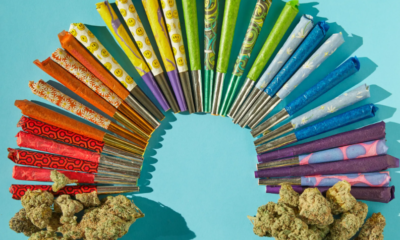Lifestyle
Why Cannabis Social Lounges Need to Be The Future of Public Consumption

Cannabis lounges are just getting started, but have a bright future!
Why Cannabis Social Lounges Need To Be The New Norm
For cannabis to be as culturally and socially accepted as alcohol is, cannabis social lounges need to be the new norm.
Thankfully, we’re starting to see more social consumption lounges sprout up around the country, in places where adult-use has been legal. These social lounges basically provide adults with a safe space where they can partake and indulge in an array of marijuana products, whether it’s smoking or consuming infused goods and beverage. In essence, they’re pretty much the marijuana counterpart of a bar.
These have been around for a long time in the Netherlands, particularly in Amsterdam, which pioneered the concept of a “coffee shop” where one can go in and easily access marijuana products. However, Amsterdam was doing so for many years while in a legal gray area, and the products being served in these coffee shops were not regulated. In the US, the scene is different because only legal marijuana can be served. Things are different in Amsterdam today, but it can be said that the Dutch coffee shops inspired the models we see around the United States, but US counterparts will have to adhere to much stricter rules and regulations.
Benefits of Social Lounges
Having said that, there are numerous benefits for cities that encourage the growth of cannabis social lounges:
Tourism: Cannabis tourists will be drawn to social consumption lounges, and it will no doubt help boost the economy. Most tourists aren’t allowed to smoke cannabis in public nor can they smoke indoors. State regulations prevent this, and while we don’t like seeing people drunk on the street, cannabis is a much safer alternative and it prevents marijuana from being exposed to underage kids on the streets.
Curb the black market: When you make marijuana easily acceptable and accessible to those of age, it will eventually help to kill the black market. Curbing the illicit market is hard enough as it is, and there is no one-size-fits-all solution; there needs to be a multi-pronged approach to doing so, and social lounges are part of the solution. Not only will adults be able to get weed in a dispensary, but they will also have the option of going to these clubs to share a joint after work instead of picking up weed from their dealers. Additionally, state regulations typically prohibit the use of black market and underground marijuana products in these places. It is so easy to find a Smoke Shop Near Me in any given area
A place of inspiration: Cannabis social lounges can inspire people of all backgrounds in multiple ways. Take, for instance, social events like painting while high, or tasting menus with professional chefs. The possibilities for crafting up a unique experience at a social club is virtually endless. On top of that, people will be inspired to create one-of-a-kind marijuana offerings to attract more visitors and tourists. Even more, once cannabis social lounges are more widespread, brands will be motivated to create innovative products such as beverages and craft cocktails that can be enjoyed particularly as an alternative to alcohol.
Harm reduction: Cannabis clubs and lounges are a fantastic place for beginners to learn the ropes. These places are staffed by experts and seasoned cannabis consumers who can share their knowledge with their peers. In the process, it contributes back to the community by means of harm reduction, ensuring that people have access to those who can guide them with the proper dosing and consumption for their safety.
Fight the stigma: Cannabis lounges are key to breaking down the stigma surrounding cannabis use. A professionally-operated and compliant cannabis social club is proof that consenting adults can be trusted to consume in a safe space legally. Right now, even with most states having legalized marijiuana in one form or another, there is still an uphill battle to fight when it comes to the stigma; many are still against legalization and thousands of people around the country struggle to obtain access to it.
Why We Have So Few Right Now
Compared to cannabis dispensaries and manufacturers, there are so little social lounges around the country. That’s because a social lounge has to jump through numerous regulatory and legal hurdles compared to other cannabis businesses.
Unfortunately, the pandemic didn’t help; there were very few cannabis social lounges to begin with, and many of them had to close because of the COVID-19 pandemic. However, owners and hopeful owners alike are hoping that things change in the near future. Colorado and California have paved the way for other states because they pioneered normalizing marijuana social lounges long ago but it’s only now that other states such as Illinois, Nevada, New York, and New Jersey are beginning to embrace the benefits that social lounges can bring.
Conclusion
While it’s fantastic news that we have so many cannabis dispensaries around us today, there’s no denying the fact that we still lack the appropriate venues to consume. Brick and mortar businesses, even in other industries, are still picking up the pieces left by the pandemic. Furthermore, the cannabis industry needs to develop new retail models – such as lounges and clubs, not relying on the success of dispensaries alone as retail models – to survive in the future.
But with the help of progressive state regulations and enthusiastic cannabis entrepreneurs, cannabis consumption lounges may hopefully become the norm in the near future. Those interested to open a lounge should always stay ahead with current state laws since the regulations for public consumption will vary from one state to another.
Business
Alabama to make another attempt Dec. 1 to award medical cannabis licenses

Alabama regulators are targeting Dec. 1 to award the first batch of medical cannabis business licenses after the agency’s first two attempts were scrapped because of scoring errors and litigation.
The first licenses will be awarded to individual cultivators, delivery providers, processors, dispensaries and state testing labs, according to the Alabama Medical Cannabis Commission (AMCC).
Then, on Dec. 12, the AMCC will award licenses for vertically integrated operations, a designation set primarily for multistate operators.
Licenses are expected to be handed out 28 days after they have been awarded, so MMJ production could begin in early January, according to the Alabama Daily News.
That means MMJ products could be available for patients around early March, an AMCC spokesperson told the media outlet.
Regulators initially awarded 21 business licenses in June, only to void them after applicants alleged inconsistencies with how the applications were scored.
Then, in August, the state awarded 24 different licenses – 19 went to June recipients – only to reverse themselves again and scratch those licenses after spurned applicants filed lawsuits.
A state judge dismissed a lawsuit filed by Chicago-based MSO Verano Holdings Corp., but another lawsuit is pending.
Source: https://mjbizdaily.com/alabama-plans-to-award-medical-cannabis-licenses-dec-1/
Business
Pot Odor Does Not Justify Probable Cause for Vehicle Searches, Minnesota Court Affirms

The Minnesota Supreme Court affirmed that cannabis odor does not constitute probable cause to search a vehicle.
If Minnesota police search a vehicle solely based upon the smell of pot, they can’t justify searching a vehicle, even if there is evidence found of other alleged crimes. Even after appealing a lower court decision to suppress the evidence—twice—the Minnesota Supreme Court agreed, and the dismissal of his charges stands.
In a ruling filed regarding a case the State of Minnesota Court of Appeals on Sept. 13, the Minnesota Supreme Court affirmed that cannabis odor does not constitute probable cause to search a vehicle.
The case has been ongoing for two years. On July 5, 2021, just before 10 p.m., a Litchfield police officer stopped a car for an obscure local law: the light bar mounted on the vehicle’s grill had more auxiliary driving lights than are permitted under Minnesota law. The officer asked the driver, Adam Lloyd Torgerson, for his license and registration. Torgerson, his wife, and his child were present in the vehicle. The officer stated that he smelled pot and asked Torgerson if there was any reason for the odor, which he initially denied. But cops found a lot more than just pot.
A backup officer was called in. The couple denied possessing any pot, but Torgerson admitted to smoking weed in the past. The second officer stated that the weed odor gave them probable cause to search the vehicle and ordered them to exit the vehicle. The first officer searched the vehicle and found a film canister, three pipes, and a small plastic bag in the center console. The plastic bag contained a white powder and the film canister contained meth, which was confirmed in a field test.
Torgenson was charged with possession of meth pipe in the presence of a minor and fifth-degree possession of a controlled substance after the unwarranted search of Torgerson’s vehicle.
Police Aren’t Allowed to Do That, Multiple Courts Rule
But the search had one major problem—cops weren’t searching for a meth pipe. They only searched his car because they could smell pot, and the meth and paraphernalia were a surprise for everyone. Still, they had no grounds to search the vehicle. The man’s charges were later dismissed after the district court determined the odor of cannabis alone was insufficient basis for probable cause to search the vehicle, regardless of whatever other drug paraphernalia they found.
The state appealed the case, but the Minnesota Court of Appeals affirmed the district court’s decision. The case was appealed a second time, this time to the Minnesota Supreme Court, which agreed with the lower court’s ruling.
“This search was justified only by the odor of marijuana emanating from the vehicle,” the Minnesota Supreme Court decision reads. “Torgerson moved to suppress the evidence found during the search, arguing that the odor of marijuana, alone, is insufficient to create the requisite probable cause to search a vehicle under the automobile exception to the warrant requirement. The district court granted Torgerson’s motion, suppressed the evidence, and dismissed the complaint. The State appealed. The court of appeals affirmed the district court’s suppression order. Because we conclude that the odor of marijuana emanating from a vehicle, alone, is insufficient to create the requisite probable cause to search a vehicle under the automobile exception to the warrant requirement, we affirm.”
It amounts to basic human rights that apply—regardless of whether or not a person is addicted to drugs.
Other States do Precisely the Same Regarding Pot Odor as Probably Cause
An Illinois judge ruled in 2021 that the odor of cannabis is not sufficient grounds for police to search a vehicle without a warrant during a traffic stop.
Daniel J. Dalton, Associate Judge of the 14th Judicial Circuit, issued a ruling in response to a motion to suppress evidence in the case of Vincent Molina, a medical cannabis patient arrested for cannabis possession last year.
In that case, Molina was arrested despite the decriminalization of small amounts of cannabis in Illinois in 2019 with the passage of the Illinois Cannabis Regulation and Tax Act.
In some states, the issue of probable cause and cannabis was defined through bills.
Last April, the Maryland House of Delegates approved a bill that reduces the penalties for public cannabis consumption and bars police from using the odor of cannabis as the basis for the search of an individual or auto. Under Maryland’s House Bill 1071, law enforcement officers would be prohibited from using the odor of raw or burnt cannabis as probable cause to search a person or vehicle.
The rulings represent the rights of citizens when they are pulled over by police, even if there are hard drugs involved.
Business
Can Cannabis Help Seasonal Depression

Ultimately, seasonal affective disorder can set in as quickly and seamlessly as the fall foliage on the trees outside.
The weather and foliage on the trees aren’t the only things that are changing around this time of year. As the sun starts to set earlier and earlier, peoples moods can be affected by the decrease in sunlight. This is often known as seasonal affective disorder (SAD), and it can make the winter months miserable for lots of people. Can cannabis help seasonal depression?
Fortunately for those that do suffer from SAD, there are numerous remedies that can make this time of year more bearable. Exercise, vitamin supplements and even marijuana can have an enormous impact on fighting against the disorder. While there are resources for offsetting the disorder, getting a full understanding of the problem is paramount in being able to overcome it.

Seasonal Affective Disorder Symptoms
One of the most crucial steps in combating SAD is properly identifying its symptoms. Some of those symptoms include:
- Anxiety
- Social withdrawal
- Sleepiness and fatigue
- Weight gain
- Suicidal thoughts
- And several others
Those who are suffering from any of these symptoms should refrain from self-diagnosis and seek professional assistance. That professional assistance could lead to more resources to fight the disorder such as an antidepressant prescription.
How Common is Seasonal Affective Disorder?
In recent years, more and more people who suffer from seasonal affective disorder have begun opening up about their struggles. An estimated 10 million Americans are said to be currently dealing from SAD. Additional research shows women are four times more likely to be diagnosed with the disorder than men. SAD also appears to be more prevalent among people with pre-existing mental health conditions like bipolar disorder.
The number of people across the globe who suffer from seasonal depression is slightly lower than that of the United States. Only about 1-2% of the global population is said to suffer from seasonal depression while about 5% of the U.S population suffers from SAD.

How to Fight Seasonal Affective Disorder
There are a number of proven ways to offset some of the sadness that comes with the changing of the seasons. For example, cannabis contains cannabinoids that can have a positive impact on mood, while potentially increasing serotonin levels. When it comes to decreasing anxiety levels, that’s where CBD comes into play. By working with our body’s endocannabinoid system, CBD has been seen as instrumental in boosting dopamine levels.
Aside from cannabis, there are a handful of other at-home methods that can help alleviate the symptoms of seasonal affective disorder. Spending more time with friends, family and loved ones can be highly effective in offsetting some SAD symptoms. The same can be said for making an effort to get lots of sunlight and getting regular exercise.
Ultimately, seasonal affective disorder can set in as quickly and seamlessly as the fall foliage on the trees outside. Knowing that you aren’t alone, and having the best practices for fighting it, can make the fall and winter months better than you could have ever imagined.
Source: https://thefreshtoast.com/medical-marijuana/can-cannabis-help-seasonal-depression/
-

 Business2 years ago
Business2 years agoPot Odor Does Not Justify Probable Cause for Vehicle Searches, Minnesota Court Affirms
-

 Business2 years ago
Business2 years agoNew Mexico cannabis operator fined, loses license for alleged BioTrack fraud
-

 Business2 years ago
Business2 years agoAlabama to make another attempt Dec. 1 to award medical cannabis licenses
-

 Business2 years ago
Business2 years agoWashington State Pays Out $9.4 Million in Refunds Relating to Drug Convictions
-

 Business2 years ago
Business2 years agoMarijuana companies suing US attorney general in federal prohibition challenge
-

 Business2 years ago
Business2 years agoLegal Marijuana Handed A Nothing Burger From NY State
-

 Business2 years ago
Business2 years agoCan Cannabis Help Seasonal Depression
-

 Blogs2 years ago
Blogs2 years agoCannabis Art Is Flourishing On Etsy







